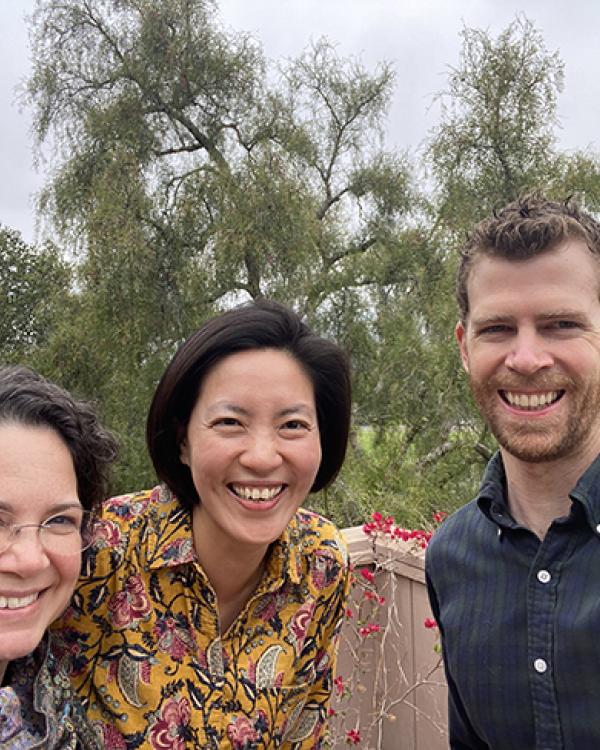
Sunghee Choi (center) with her advisors Diana Arya (l) and Andrew Maul (r)
Sunghee Choi has earned her Ph.D. from the Department of Education, where she worked with Dr. Diana Arya and Dr. Andrew Maul. After being away from school for a long time, she received her M.A in education from UCSB. As a mother of a 12-year-old autistic son, her research interests are how to define autism, how to develop more ethical and fair autistic assessments by incorporating autistic people’s voices, and how to promote more inclusive education with UDL, rejecting ABA.
GGSE: Your dissertation is "Rethinking the Validity of Autism Assessment." What major ways did you discover such assessment should be thought about differently?
Choi: Currently, autism assessment instruments are designed to be filled out by caregivers and the assessment process relies on the passive observation of autistic children's behaviors by the trained professionals. Through my study, I claimed that we need to pay more attention to autistic people's voices and to find ways to include their voices directly in the assessment process. Also, I showed that not enough studies have been conducted to examine whether the communicative intentions of autistic people have been interpreted correctly by the caregivers and professionals because in many cases autistic people's behaviors are judged as abnormal without offering appropriate standards due to the deficit views.
GGSE: You are a proponent of Universal Design for Learning (UDL). Why is it more effective in the special education classroom?
Choi: Universal Design for Learning (UDL) is innovative in that it does not try to fix the students but fix the classrooms and school system. In UDL, we attribute students' failure to the lack of accommodation in the classroom, not to the deficits of the students. This conceptual shift helps teachers to redesign their classroom, lesson plans and curriculum, but unfortunately, UDL still does not provide specific "how"s to implement its principles. I think we need more research on how we redesign the classroom environment to accommodate diverse needs of students.
GGSE: As a student who had a break in her education timeline, what advice would you offer for other "non-traditional" students?
Choi: As a non-traditional student and a single mom of an autistic child, I struggled a lot in the beginning, but setting a small goal for every day has helped me to endure the long-term research and work in the graduate school. In terms of writing, writing one-page-a-day helps me a lot to finish my Comps and dissertation. Also, I'd like to say without the help of supportive people around me, I would not have finished this program. Thoughtful professors, kind staff, and supportive friends in our department have helped me a lot in finding my research interests and completing each milestone.
GGSE: What's next?
Choi: I don't know. I do not have any plans yet, but I would like to do some work to make changes in autistic people and their family's life in a community in Korea.
GGSE: Are there people at the Gevirtz School you would like to thank?
Choi: I have to thank all the people in GGSE. In every step in this program, there was their help and kindness. Especially I appreciate all the work of my committee members. Dr. Arya who helped me to find my research interest, Dr. Maul who helped me to examine autism through the lens of validity, and Dr. Lambert who guided me to the world of neurodiversity and UDL. Also, I feel grateful for our TEP program and teachers from our TEP program who have taught and raised my son with love and patience in local schools so that I can focus on my graduate work.